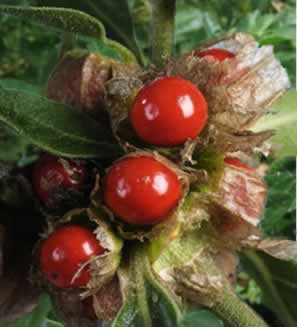 Scientific Name: Withania somnifera
Scientific Name: Withania somnifera
ASHWAGANDHA
Other Names:
Ajagandha, Amangura, Amukkirag, Asana, Asgand, Asgandh, Asgandha, Ashagandha, Ashvagandha, Ashwaganda, Asoda, Asvagandha, Aswagandha, Ayurvedic Ginseng, Cerise d'Hiver, Clustered Wintercherry, Indian Ginseng, Winter Cherry, Withania.
Ashwagandha (Withania somnifera) is a plant in the Solanaceae or nightshade family valued in ayurvedic medicine as a medicinal plant to promote overall good health. For couple of centuries, Ashwagandha has been used in India, Pakistan and Sri Lanka in traditional medicine. It is used to treat and prevent memory loss, impotence and debility among others. For these perceived health benefits, Ashwagandha is sometimes referred to as the Indian ginseng. Its name - Ashwagandha means “scent of a horse” in Sanskrit, owing probably for the root’s horse-like smell.
Ashwagandha Description
Ashwagandha is an erect annual branched shrub that is native to South Asia, Middle East and North Africa. Ashwagandha can grow to a height of 4 feet with simple, ovate leaves about 10 cm long. It has hermaphrodite flowers, yellow to greenish in color about 5 cm in width that blooms all year round. Ashwagandha fruits are berry like about 5 cm in diameter that is enclosed in a calyx. The shape is globose, green when unripe and turns to red-orange as it ripens it is sometimes called winter berry. Ashwagandha seeds are bean shaped, yellow to red orange coloured, somewhat scally. It has a central stem and branches are covered by wool-like hairs.

 Scientific Name: Withania somnifera
Scientific Name: Withania somnifera

